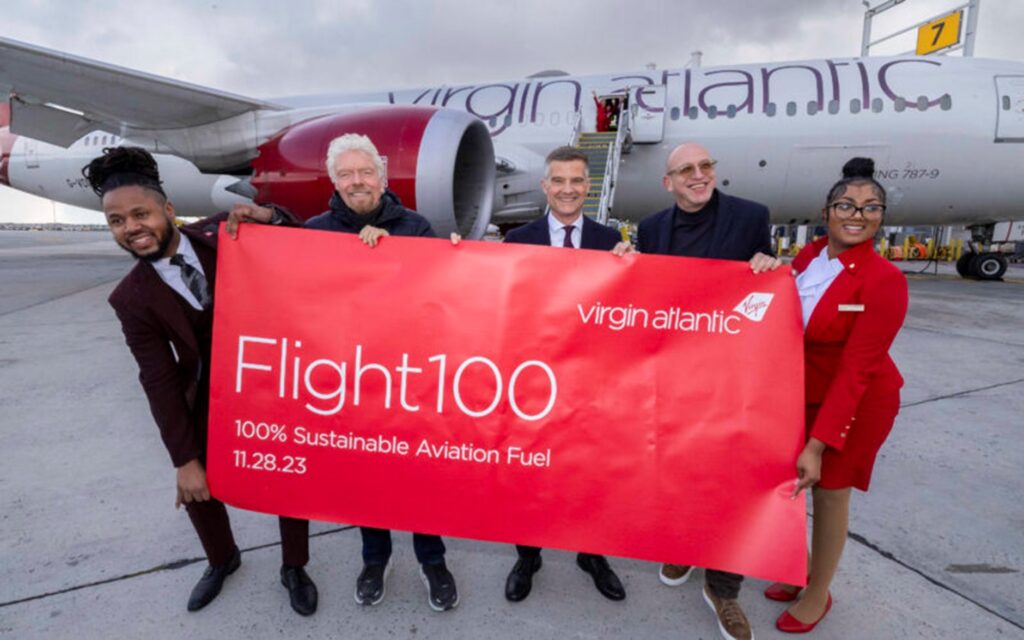
Photo: Virgin Atlantic
Virgin Atlantic and British Airways have been officially sued for their sustainable flight claims in the same week that a Virgin Atlantic aircraft made history by flying across the Atlantic Ocean solely on sustainable aviation fuel (SAF).
Airlines are facing accusations that they misled prospective consumers over aviation’s environmental credentials, which led to this legal action.
Official complaints have been lodged against the two major airlines by the climate awareness charity Possible and the law firm Leigh Day in response to their claims regarding reducing emissions from flights.
According to complaints submitted to the OECD, both airlines are accused of deceiving customers with their claims of lowering carbon emissions from flights. The general public needs to gain the knowledge to understand the limitations of decarbonisation technology, which is the basis of the criticisms levelled.
British Airways claims to be “driving urgent action towards net-zero emissions” and to have a “clear roadmap to achieving net-zero carbon emissions by 2050,” according to the complaints. According to the report, from 2016 to 2019, the airline’s jet fuel emissions increased annually.
However, Possible claims Virgin Atlantic promotes its “mission to nett zero” without saying it isn’t meeting its carbon goals.
“The reality is that technologies for cleaner flight either don’t work or don’t even exist yet,” said Alethea Warrington, Possible’s senior campaigner. “We think that airlines’ misleading claims about their emissions are unfair to people who want to do the right thing when they travel. It’s time for airlines to be honest about their sky-high emissions.”
On 28 November, following a seven-hour and seventeen-minute flight from London-Heathrow Airport, Virgin Atlantic’s high-profile flight touched down at New York-JFK Airport. The UK government partially supported the mission with Air BP and Rolls-Royce.
Scientists and environmental groups are still cautious about the future of SAF as a large-scale propulsion for air travel, even if the flight drew more attention to the technology.
The aviation industry asserts its ability to employ crop-based biofuels or renewable energy-derived green hydrogen. However, according to research published by The Royal Society, to produce enough aviation fuel to achieve its goals of net-zero flying, the UK would need to allocate half of its cropland or more than quadruple its entire renewable power supply.
The nonprofit organisation also cites studies that compare the environmental impact of biofuels and traditional jet fuels across their entire life cycles. Claiming to be reduced at a systemic level, it said that both feedstocks produce fuels with tailpipe emissions comparable to kerosene.
The organisation expressed concern about the environmental impact of biofuels, stating that there is no area to grow enough crops to power aircraft without creating significant deforestation. This, in turn, leads to higher emissions and makes biofuels just as harmful to the climate as kerosene, if not worse.
British Airways was the first airline to voluntarily participate in the UK emissions trading plan and record its carbon footprint over twenty years ago, according to a British Airways official responding to the claims.
The 100% SAF flight operator, Virgin Atlantic, stated their commitment to achieving nett zero by 2050 and their interim objectives on the route there, including using 10% sustainable aviation fuel by 2030.
“The fleet we operate and fuel we burn are the two levers for delivering in-sector carbon reductions in the short to medium term,” stated a Virgin Atlantic spokesperson.
“We already have one of the most modern and efficient fleets flying across the Atlantic.” “In addition to fleet renewals, SAF provides an immediate opportunity to deliver lifecycle carbon reductions of up to 70%, which we have been pioneering for over 15 years,” the spokesperson said.
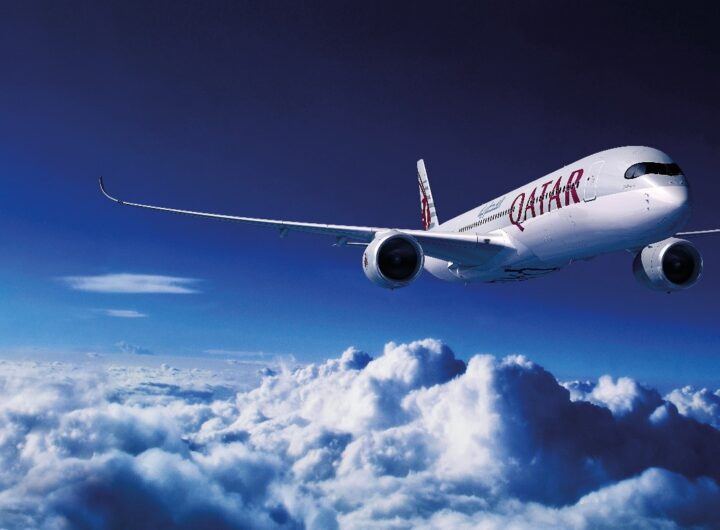 Qatar Airways Resumes Flights To Malta: Enhancing International Connectivity
Qatar Airways Resumes Flights To Malta: Enhancing International Connectivity  Turkish Airlines Crowned Best Airline in Europe for the Tenth Time
Turkish Airlines Crowned Best Airline in Europe for the Tenth Time  Taking on the Tasman: Air New Zealand Unleashes 1.7 Million Seats for Summer
Taking on the Tasman: Air New Zealand Unleashes 1.7 Million Seats for Summer  Oman Air Elevates In-Flight Dining with Exquisite Omani Rock Rose Dessert
Oman Air Elevates In-Flight Dining with Exquisite Omani Rock Rose Dessert  Cathay Pacific Elevates Inflight Dining with ‘Chinese Classics’ Menu
Cathay Pacific Elevates Inflight Dining with ‘Chinese Classics’ Menu 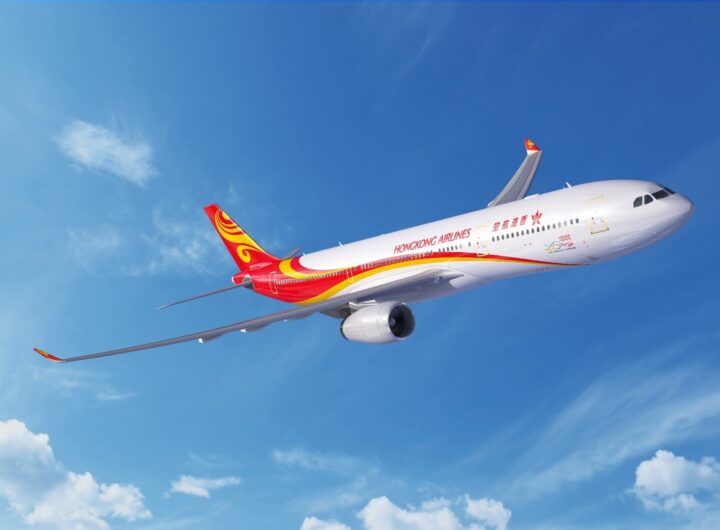 Hong Kong Airlines Set to Land in Sydney—And Travellers Reap the Rewards
Hong Kong Airlines Set to Land in Sydney—And Travellers Reap the Rewards  Viking Cruises Unveils 14 New Ocean Itineraries for 2026 & 2027
Viking Cruises Unveils 14 New Ocean Itineraries for 2026 & 2027 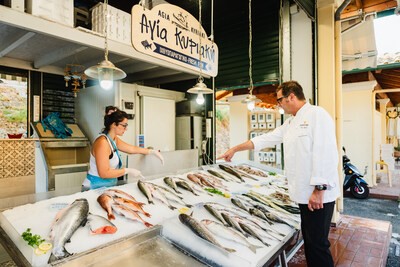 Seabourn Elevates Onboard Dining with New Menus and Local Flavours
Seabourn Elevates Onboard Dining with New Menus and Local Flavours 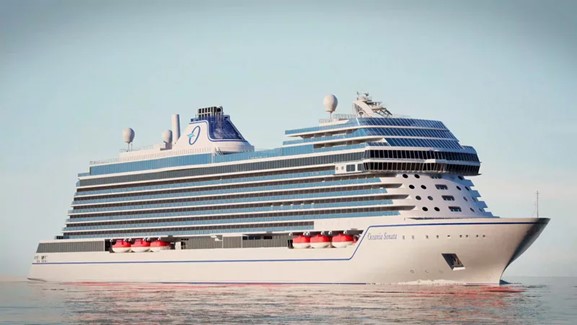 Oceania Cruises Marks a New Era with the Construction of the First Sonata Class Ship
Oceania Cruises Marks a New Era with the Construction of the First Sonata Class Ship 